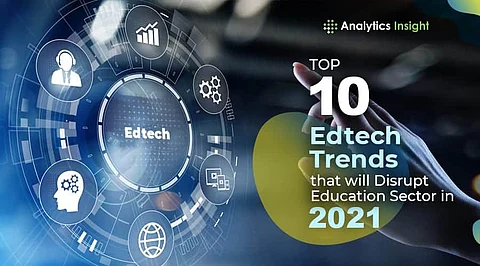

Edtech is booming. The modern education world is slowly merging with the latest technology to improve the way students learn. Technology in the classroom has always been an education benefit, enabling personalised, mastery-based learning, saving time for teachers and equipping students with the digital skills they need in the future. According to Association for Education Communications and Technology (AECT), edtech is something that facilitates learning and improves performance by creating, using, and managing appropriate technological processes and resources. However, educators who use edtech feel that it is a concept that transforms the old paper-and-pencil way of teaching to digital forms. A report by KPMG and Google suggests that the edtech market is expected to cater t 9.6 million users and have a market share of US$1.96 billion by 2021. The Covid-19 pandemic has accelerated the change with more technological invasions. Analytics Insight brings you a list of edtech trends that are expected to see high adoption in 2021.
The boring way of teachers writing on the blackboard and students copying the content is far left behind. Artificial Intelligence (AI) has transformed the education sector to embrace futuristic technologies that make learning easier. Virtual reality and augmented reality is one such disruptive technology moving the learning process towards improvement. By using virtual and augmented reality, students get an experimental learning experience. While VR provides a constructed reality, AR gives an enhanced view of a real image. This helps explain complex concepts of learning. For example, it is very useful in medical courses where most of the classes need intense explanation.
Blockchain is a major unexpected technology that is making breakthrough changes in the education sector. The Distributed Ledger Technology (DLT) from blockchain brings a great deal to storage. The education industry has a lot of data to store. Blockchain houses them in a secured manner. Every time a new data is added, blockchain technology adds another 'block' to the system, making the storage technically limitless. Eventually, the data gets encrypted and distributed across multiple computers in the system. It makes transacting data decentralised and transparent.
Smartphones are the gift that the 21st century gave to people. Millennial are well aware of the applications and right usage of smart devices than adults. Henceforth, availing education through mobile technology is what is trending in the Covid attacked world. For example, students have folders on their iPhones named 'education,' where they keep education apps like Google Classroom, Google Docs, and Google Sheets.
Video is an ultimate source where people get extensive knowledge about something in a live form. Today, more than 2.3 billion people are active on YouTube. People watch these videos for entertainment and education. Instead of reading long paragraphs, students also prefer to watch vidoes for better understanding and knowledge retention process. Innovations like smart television, android-powered television, etc. are further increasing the video conception for education purpose. Teachers are also engaging in showing video content rather than plainly explaining students on how the technology works.
Among all other edtech trends that made a cut in 2020, online learning stood out and topped the list. Online learning was on the line of improvement even before the pandemic. A report shows that around 2.7 million K-12 students are taking at least one online course in the US, most of which are offered by public schools. Today, the adoption has multiplied with emerging online tools and technologies.
Artificial intelligence is the core of edtech. AI has availed millions of use cases across multiple sectors and a considerable amount to education as well. For example, face recognition technology is used to take attendance by recognizing students face automatically. AI enables a list of features in exam monitoring. It identifies cheating during online exams and conducts online invigilation through AI-powered auto proctoring.
Robotics is gaining wide acceptance in the education sector. Developing and coding robots help students experience a different level of practical education. Robotics also allows flexible teaching and learning systems that will benefit all students, especially, students with disabilities. For example, a visually impaired student uses voice assistants or mobile apps to learn.
Addressing every individual's need is a critical task in education. No teacher or guide can separately look into every student and teach according to their way of understanding. However, edtech services work hard to personalize the learning experience and are trying to address everybody's needs. Online education services leverage the facility for students to take up tailored courses as per their wish. Adoptive learning acknowledges student's downturns and addresses them.
The education market is expanding. So is big data. However, availing big data in a useful way to cater to student's need is the only way to make it beneficial. As the education sector grows, institutions will also need more relevant data to customize and present the course in a suitable format.
Everyone loves to play. When the classes go boring for a long time, conducting games is a good way to engage with students. Games are expected to enrich the learning process. In the modern age, when it is big trouble to make students attend classes, educators can boost student engagement and encourage active learning through games. Online games are further easy and accessible as they embrace every individual's interest.
Join our WhatsApp Channel to get the latest news, exclusives and videos on WhatsApp
_____________
Disclaimer: Analytics Insight does not provide financial advice or guidance. Also note that the cryptocurrencies mentioned/listed on the website could potentially be scams, i.e. designed to induce you to invest financial resources that may be lost forever and not be recoverable once investments are made. You are responsible for conducting your own research (DYOR) before making any investments. Read more here.
